
The other day, I was asked to contribute a chapter to a global communication manual by my professional association. I was honoured to be asked and quickly said yes. Later that night, I noticed some interesting posts on twitter that fell into two camps:
1. An individual who was insulted to be asked to "work for free."
2. Another who was incredulous and thrilled that she was included and asked to contribute her expertise.
As someone who says yes to volunteer assignments more often than I should, I wondered if there was a way to make better decisions on when to work for free and asked my network on LinkedIn and twitter to share their thoughts.

The feedback was great and I want to say thank you to all of you who contributed. The result is a list of considerations that I hope help you make better decisions. Although I would have liked to have credited all responses, it would make for too long an article, so I'm hoping I have captured all of your sentiments on when you should WORK FOR FREE.
When you believe in the cause - Whether it's a non-profit or association, you don't mind working for free when you love the cause and genuinely want to contribute. There's something empowering about feeling you're making a difference, and doing it because it's the right thing to do. People want to contribute to causes close to their hearts.
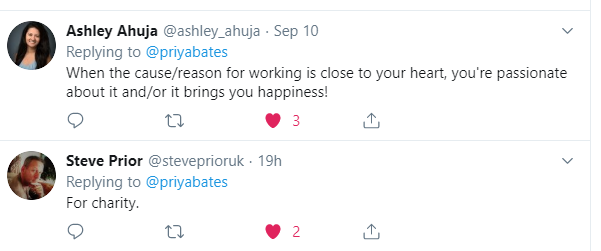
When you want to give back or pay it forward - Many of those who piped in felt that working without expectation of payment helped them express gratitude and give back for the blessings in their own lives. Sometimes you want to pay it forward because someone took the time to help you when you needed it?
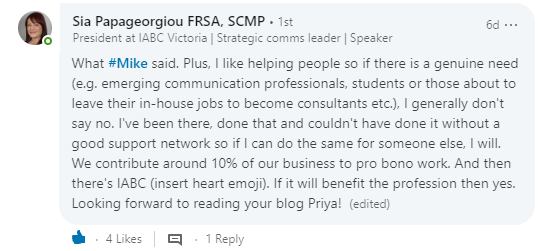
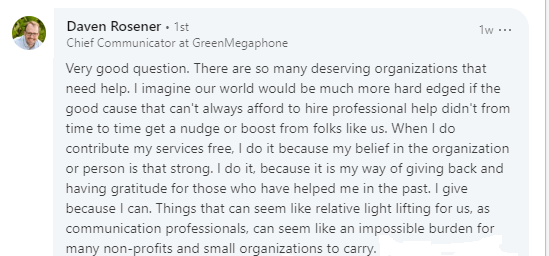
When you want to learn new skills - A few mentioned that they worked for free when they wanted to gain experience. Early in my career, I used volunteering to learn and get hands-on experience that I couldn't get in junior positions in my workplace. In fact, to this day, I believe I got to manage people early in my career simply because of my volunteer experience.
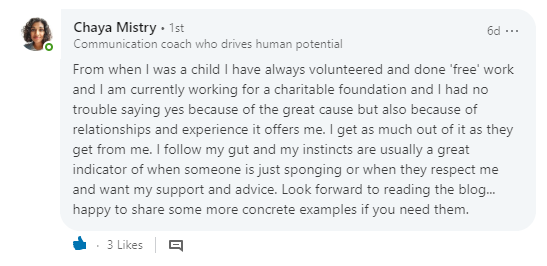
When it gives you exposure or access - Some told us that there is no such thing as free. You do it for a reason, an exchange, or exposure... because both sides get something out of it. This often happens when I partner with technology companies or conference organizations to provide my time and expertise. I feel it's an investment in marketing and reputation on top of sharing my philosophies.


When it gives you joy - Some work for free for pure joy. I see that with friends who join community choirs, symphonies, and theater. I see those who knit for hospitals or create art for charity or volunteer to organize fundraising events. In Communication, some volunteer because they feel like they are surrounded by people with similar passions.
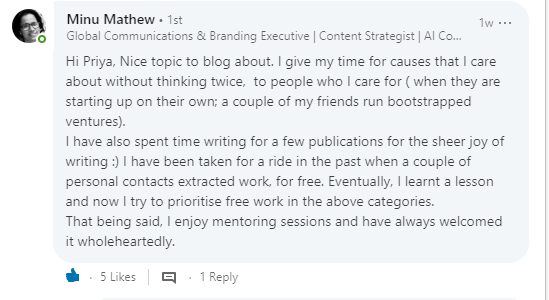
When it's your mom asking for help - This one made me laugh, but we've all been there to help family and close friends. We just need to know when to draw the line and set some limits.

Drawing the line - What's clear to me is that I have a lot of generous friends and followers. That being said, many told us that it's important to set boundaries. From a health perspective, we need to have more balance and not spread ourselves too thin. And with many of my colleagues working for themselves and selling their expertise, they need to ensure that they don't devalue the work they do by giving it away or take time away from paid work.
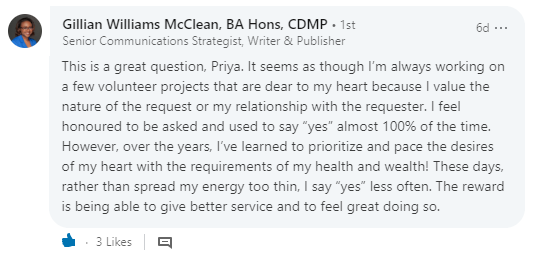

Create a giving strategy -As a mom, wife, business owner, team manager, thought leader and active volunteer professionally and personally, there needs to be time for me to plan, dream, strategize, think, reflect, and rest. I've started actively setting limits for myself.
My list looks something like this:
- Focus my IABC volunteer involvement: Right now that includes one global conference, one speaking opportunity at regional conference and evaluating Gold Quill at one Blue Ribbon Panel. In the past, I have lead great efforts like re-branding the association or leading Gold Quill and may do so again, but for now I'm taking a break.
- Creating my content marketing and thought-leadership strategy - In addition to conferences, I write my own blogs (not as often as I like), blog for other organizations, contribute to other publications and participate in webinars and podcasts. Part of this is driven by my passion to move Internal Communication forward. In addition, being seen as a thought leader globally in the space that I do business is not a bad thing. I focus on the areas of Internal Communication Strategy, Employee Engagement and Change Management and actively put a half-day aside each week for this and see it as an investment. Recently, this has led to paid opportunities to write more in-depth content for companies who want me to share my expertise with their customers.
- Setting up a monthly group Coffee Chat in Toronto to answer the request to meet for coffee or pick my brain. This allows me to set limits on my time monthly at a convenient place and time that works for me. To give you a sense of the number of requests I receive, I limit the group number to five individuals per month and at this point, we're fully booked for the next two events with only a few spots left in December.
- Setting limits on a briefing meeting. My friend Jennifer Wah had a great statement. She tells clients, "I'll tell you the WHAT for free, it's the HOW that will cost you." I've also taken direction from Rachel Miller with All Things IC who, based on availability, will give you one 15-minute conversation for free and then charge for her time for further mentoring or training. Although I plan to create more formal mentoring programs, at this time, I go through a briefing process with clients to understand their needs and create a "What"-based proposal outlining our process, methodology and expertise. Everything after that happens once a contract is signed and we've been set up as a vendor or trainer.
- Time for fun - With two daughters at home, I make sure I make time for the fun projects. Baking for fundraisers, volunteering to sell tickets, donating to clothing and food drives, attending gatherings for causes I believe in to support my community.
So when setting your work-for-free strategy, ask yourself the following questions:
1. Do I have time? How much time weekly/monthly am I willing to give?
2. Is this getting in the way of paid work?
3. Are they asking for the expertise I get paid for? What are my limits?
4. Is this a good opportunity or investment - to network, showcase my expertise, meet potential clients, manage my brand, learn a new skill or get something in return?
5. Is it a cause I believe in?
6. Does this help me give back to my community or pay-it-forward?
7. Does it bring me joy?
Here's what's clear to me. There is not one right answer. I probably worked for free more when I was building my career or building my business. The success, along with a growing family, has created an inverse relationship with the time I have available. That being said, volunteering, mentoring and generally contributing to my personal and professional communities have just been a part of who I am, and I always carve out time to meaningfully WORK FOR FREE.
Here's what's clear to me. There is not one right answer. I probably worked for free more when I was building my career or building my business. The success, along with a growing family, has created an inverse relationship with the time I have available. That being said, volunteering, mentoring and generally contributing to my personal and professional communities have just been a part of who I am, and I always carve out time to meaningfully WORK FOR FREE.
We'd love you to pipe in to the conversation? What are your thoughts?